Your Go-To Auto Components Shop for Engines for Africa and Extra
Your Go-To Auto Components Shop for Engines for Africa and Extra
Blog Article
The Quest for Ultimate Driving Power: Examining the Pinnacle of Engine Efficiency and Technological Breakthroughs in the Automotive Field
In the realm of automobile engineering, the quest of optimum driving power has been a ruthless quest that has unfolded with the evolution of engine layout and the assimilation of sophisticated innovations. From the thorough workmanship of burning engines to the rapid developments in electric propulsion systems, the auto sector stands at the cusp of a new period identified by unprecedented efficiency capacities. As designers and researchers dive deeper into the realms of computational fluid characteristics and discover cutting-edge fuel technologies, the horizon of opportunities increases exponentially. Stay tuned as we decipher the elaborate tapestry of technological advancements that are shaping the future of vehicle power and performance.
Evolution of Engine Layout

In addition, the combination of turbocharging and turbo charging modern technologies has transformed engine style by increasing power without considerably boosting engine dimension. These forced induction systems press the consumption air, enabling more gas to be combusted, thereby creating better power output from a smaller engine. This improvement has been particularly vital in boosting the efficiency of smaller sized variation engines while maintaining fuel efficiency criteria.

Performance-Enhancing Fuel Technologies
The execution of innovative fuel innovations has actually significantly contributed to boosting engine efficiency in modern-day vehicles. From traditional gas and diesel to cutting-edge biofuels, artificial fuels, and hydrogen, the vehicle industry is witnessing a transformation in fuel choices. Biofuels, acquired from eco-friendly sources like algae, corn, or sugarcane, deal decreased exhausts and boosted engine effectiveness. Artificial gas, created with chemical processes, offer high octane ratings, boosting power output. Hydrogen gas cells, although still in the very early phases of adoption, show wonderful pledge because of their zero-emission nature and possibility for high efficiency. Furthermore, gas additives and detergents are being formulated to tidy engine elements, maximize combustion, and reduce rubbing, thereby boosting general automobile performance. With recurring research and development, the quest for the best driving power proceeds, as designers strive to open the full capacity of performance-enhancing gas technologies in the auto market.
Innovations in Electric Propulsion
Substantial strides in electric propulsion innovation have changed the automobile industry, paving the means for a new era of lasting and reliable transport. Electric vehicles (EVs) are gaining popularity because of their environmental benefits and improvements in battery technology, allowing longer driving arrays and much shorter billing times. Suppliers are investing greatly in r & d to improve the efficiency of electric propulsion systems, concentrating on increasing power output, improving energy performance, and minimizing overall weight.
One notable innovation in electrical propulsion is the development of sophisticated electric motors that deliver greater torque and power density, resulting in improved acceleration and general driving performance. Additionally, regenerative braking systems have been refined to keep and record energy during deceleration, further enhancing the performance of EVs.
Furthermore, the assimilation of smart innovations, such as expert system and anticipating analytics, is optimizing the monitoring of electrical propulsion systems, making sure optimal efficiency under numerous driving conditions. These improvements in electrical propulsion are reshaping the automobile landscape, driving the sector towards a much more sustainable and electrified future.
Impact of Computational Fluid Dynamics
With advancements in electrical propulsion pressing the limits of automotive technology, the integration of Computational Liquid Characteristics is playing a critical role in maximizing wind resistant efficiency and improving general efficiency in car style. Computational Fluid Dynamics (CFD) involves using computer system simulations to examine the flow of air around an automobile, enabling engineers to anticipate just how style adjustments will impact aerodynamics without the demand for costly physical models. By accurately modeling air flow patterns, CFD enables for the refinement of car shapes to reduce drag, improve air conditioning, and boost security.
CFD enables engineers to optimize air flow around parts such as radiators, engine bays, and wheel wells, adding to improved efficiency and total driving experience. In final thought, the integration of Computational Liquid Characteristics represents a substantial step forward in the quest for utmost driving power and performance in the automotive sector.
Future Patterns in Engine Technology
In the dynamic landscape of auto design, innovative innovations are shaping the future trajectory of engine advancement. The future of engine style is noted by a strong focus on sustainability, efficiency, and performance. Makers are increasingly concentrating on developing engines that not only deliver high power results yet likewise prioritize ecological responsibility by decreasing discharges and boosting fuel efficiency.
One noticeable pattern in engine development check my source is the rise of electrification. Hybrid and electrical powertrains are getting grip as practical choices to conventional combustion engines. These modern technologies supply the potential for significant decreases in carbon discharges and enhanced power effectiveness, straightening with global efforts to battle climate adjustment.
Additionally, innovations in products science and production techniques are making it possible for the manufacturing of lighter and much more sturdy engine parts. This shift towards lightweight materials such as carbon fiber and aluminum alloys adds to improved efficiency and fuel economic climate.
Conclusion
To conclude, the search of supreme driving power in the vehicle sector remains to drive developments in engine style, fuel modern technologies, electrical propulsion, and computational liquid characteristics. The development of these innovations is shaping the future of engine innovation, paving the way for a lot more powerful and efficient lorries (engines for africa). As the market remains to push the boundaries of what is possible, we can anticipate to see much more innovative advancements in the mission for peak performance
One of the key milestones in engine style development is the change from standard carbureted engines to contemporary fuel-injected systems. By exactly metering the gas delivery to each cyndrical tube, fuel-injected engines enhance combustion, resulting in much better efficiency and reduced ecological effect.
Additionally, the integration of turbocharging and my review here supercharging innovations has changed engine layout by enhancing power without considerably raising engine dimension (engines for africa).The implementation of innovative gas modern go now technologies has considerably added to enhancing engine efficiency in modern-day automobiles. Furthermore, gas additives and cleaning agents are being formulated to tidy engine parts, optimize burning, and decrease rubbing, thus increasing general lorry efficiency
Report this page